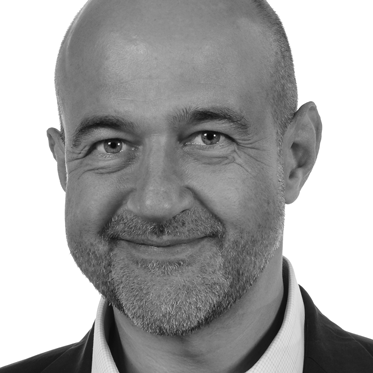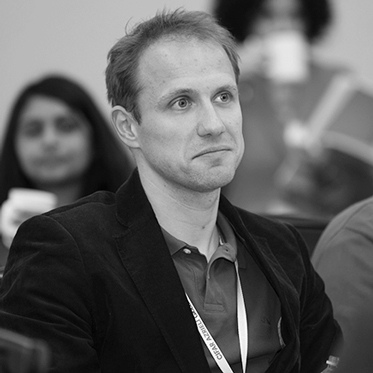By: Gerhard Kirchmair
31 Jul, 2018

This Q&A is part of CIFAR’s series on building a research lab.
Gerhard Kirchmair is a CIFAR Azrieli Global Scholar in CIFAR’s Quantum Information Science program, Professor of Experimental Physics at the University of Innsbruck and Junior Research Director at the Institute for Quantum Optics and Quantum Information of the Austrian Academy of Sciences. Gregor Weihs is a Fellow in CIFAR’s Quantum Information Science program, Professor of Photonics at the Institute for Experimental Physics at the University of Innsbruck, Associate of the University of Waterloo’s Institute for Quantum Computing and Vice-President for Natural Sciences and Engineering of the Austrian Science Fund.
Gerhard Kirchmair (GK): Tell me about your first faculty position: What was it like and where was it?
Gregor Weihs (GW): The first faculty position that I would count in that respect was the one in Waterloo. It was quite different from what I expected in some ways because it was in Canada, very different from Austria, where I was from, even though I had been at Stanford in between.
I found teaching quite intense, much more intense than here. In the end it’s the same amount of work, but because you’re a faculty member you’re responsible for the entire course, for the lecture component and for assignments. Even though you have a TA it’s still a lot of work to take care of everything. And there’s almost no way to get someone to substitute for you in class. It’s expected that you teach them all in person, so it’s very hard to travel to conferences during the term.

CIFAR Fellow, Gregor Weihs
GK: So, how much time did you spend at the University of Waterloo?
GW: Four years. There was a lot of administration in the course of building the Institute for Quantum
Computing in Waterloo. At that point it had existed only for two or three years, and there were a lot of meetings for hiring post-docs, hiring faculty, coordinating visitors, planning the new building and so on.
GK: What was your lab like at the beginning?
GW: I’m an experimentalist, so I arrived and there was no lab. There was a former server room which was not fit to be a lab at the time and it took ages to get all this fixed. IQC had just moved to that building so there was no way I could have had this prepared before I went there.
There was quite a learning curve to how to get things from the machine shop or what to expect from the electronics shop.
GK: Exactly, you have to learn all the rules on how it’s done.
GW: The other thing is that it was difficult to find students who were interested in doing experiments. There were good applicants but none of them wanted to be experimentalists. And Waterloo was certainly not known at the time for optics, or even quantum optics, and so it was really hard.
GK: Did you wait to start doing experiments?
GW: No, we actually started very early on. I ordered all kinds of equipment but, for example, one of my first PhD students poured concrete pads for the optical table legs himself, because there was just no way to get a contractor to do this without, you know, all the specifications. There was some old raised flooring in there, where we did not know what the load rating was and it was totally chaotic. It was like building a lab in the garage.

CIFAR Azrieli Global Scholar, Gerhard Kirchmair
GK: Quite something. So, did you receive any training or guidance on how to build a research programme and lab?
GW: Not actively. Only sort of by imitation… I had a lot of experience with actual lab set-up but not how to find students, how to run a group efficiently or how to figure out who’s good and who’s not before you actually hire them.
p.p1 {margin: 0.0px 0.0px 0.0px 0.0px; font: 12.0px ‘Helvetica Neue’; color: #454545}
There was some old raised flooring in there, where we did not know what the load rating was and it was totally chaotic. It was like building a lab in the garage.
GK: What was the best advice you received?
GW: The best advice was “never hire just because you can.” And in fact, I would turn this around. If you have an excellent person who wants to work with you, try to hire them at all costs, even if you have to spend the last of your money.
So, it goes both ways. But hiring mediocre or even hiring people who can be a real drain on the group takes more effort than it ever benefits you.
GK: What’s the most valuable thing you learned in those first few years about building a research programme at the lab?
GW: Well in hindsight I would say that I started way too ambitious in what I wanted to do, and didn’t think the things through enough to figure out what would work in what time.
I think what was really lacking was sort of group time management, or an idea of what people who come there with almost no training could actually achieve. It’s very different having worked in a group where everything was set up. When everyone is new except you then that’s a difficult bootstrapping process.
I see some young colleagues where I think, wow, what they have planned sounds amazing but there’s no way they’re going to get that done in five years.
GK: That very much reflects my experience in the last couple of years. What do you think we should be teaching early career professors about building a research programme?
GW: Think about the long-term goal but also think about intermediate research results and things that your students can publish because the time for evaluation and tenure review is closer than you think.
And don’t waste time building too many different things. Take a focused approach.
p.p1 {margin: 0.0px 0.0px 0.0px 0.0px; font: 12.0px ‘Helvetica Neue’; color: #454545}
‘Never hire just because you can.’ And in fact, I would turn this around. If you have an excellent person who wants to work with you, try to hire them at all costs, even if you have to spend the last of your money.
GK: What’s one mistake you made during your career and how did you compensate for it?
GW: If I look at maybe one or two research projects or ideas that didn’t work out in the end, I think I held on for too long. It kind of sounded cool but it didn’t work, because we didn’t have the facilities to fabricate the structures properly, and we tried to get it from elsewhere but that didn’t work so well. So, cut your losses, that’s what the stockbrokers do, right? Don’t hang on to something too long if it’s failing.
GK: What are your best practices for ensuring your lab is run well and that equipment and other resources are well cared for?
GW: Make sure that you have some people in charge who value their equipment. So, the things that are permanent you really have to take care of yourself, and then with smaller stuff, you have to make sure that people value what they work with. They should know that their PhD depends on it.
You should always have a little bit of reserve money for urgent stuff. But don’t try to save money too much. It wastes a lot of time too. Sometimes it pays off to haggle with the companies, but don’t delay; it costs even more in time afterwards.
GK: How do you help new people get up to speed with your lab’s way of doing things?
GW: Oh, I have to admit I leave that to the post-docs mostly and it seems to work. The post-docs have their own ways of going about this, but by and large it’s by shadowing, and they just work together for a while, and then the young people learn. From time-to-time a post-doc will give a little course for everyone to understand a specific technique.
GK: How many people should a group have?
GW: I think no more than you can proofread papers and theses. You want your group to be productive so you don’t want to be the roadblock to getting a paper out – and nothings goes out unless I approve it. This policy has saved us from some embarrassments. For me personally that limit is at about 12 people, maybe a few more. But six PhD students is about the limit.
GK: Do you have tips for structuring and efficiently communicating with a large team like yours?
GW: In my group it’s really divided into some subgroups that work on subtopics. In the general group meeting, we talk about general lab matters and people get mutually updated on what’s happening. But we don’t need to discuss details of how the experiments go with everyone, that would be just confusing.
I think we’re quite well organised in terms of Wiki and file sharing and all of the technical parts. But other than that, nothing special is needed.
GK: Funding-wise, should you aim for large grants or smaller, more accessible ones?
GW: Both. Get everything you can. That’s not totally true actually … administrating large grants from complicated organisations can be a pain too. But I mean some small ones in between don’t hurt really.
GK: Do you have any tips for grant writing?
GW: I have a much different view now that I’m also the Vice-President of the Austrian Science Fund. And what I do see is that the grants that are written in too technical and too detailed a way very often get rejected.
Very often the referees are not so specialised in your area, and if they don’t get the reason why you’re excited about this research then it will fail. Even if it’s the most stunning technical achievement, everybody will fall asleep if it’s not really a topic in their own backyard. So, I think the largest part has to be about the motivation – why do you want to do that and why are you excited and enthusiastic about it? And once you’ve won the referee over that way they will gloss over a lot of omissions on the details. Of course, you can’t be wrong on those either. I mean that will be even worse.
I think at some point you have to meet the people in person. Travel for collaboration is really important.
GK: Last question. How do you develop partnerships with potential users and in general?
GW: In general, I think at some point you have to meet the people in person. Travel for collaboration is really important. Once you know them, you don’t have to meet them every every month. I try to do that, but if you notice some people don’t respond within a reasonable time you should think about whether they really want to collaborate with you.
I think about some past collaborations where I had to work really hard to keep it up because we were more the consumer of what they had, but they weren’t really so keen on sharing it with everyone.
Whereas others were really interested and out came very productive things, even unexpected things. So, it’s not always easy from the start to see whether it will be productive or not. One should often give it a try and then be honest if it doesn’t really work.
GK: Thank you for the interview.
Read more articles from the Building a Research Lab Series
p.p1 {margin: 0.0px 0.0px 0.0px 0.0px; font: 12.0px ‘Helvetica Neue’; color: #454545}